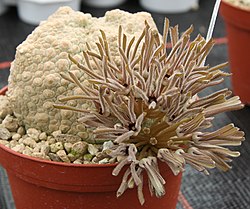Pseudolithos
| Pseudolithos | |
|---|---|

| |
| Pseudolithos migiurtinus plant in cultivation | |
| Scientific classification | |
| Kingdom: | Plantae |
| Clade: | Tracheophytes |
| Clade: | Angiosperms |
| Clade: | Eudicots |
| Clade: | Asterids |
| Order: | Gentianales |
| Family: | Apocynaceae |
| Subfamily: | Asclepiadoideae |
| Tribe: | Ceropegieae |
| Genus: | Pseudolithos P.R.O.Bally |
Pseudolithos is a genus of succulent flowering plants of the family Apocynaceae, indigenous to arid areas of Somalia, Yemen and Oman.
Description and naming
[edit]The plants were first described as a genus in 1965; the name "Pseudo-lithos" means "false-stone" and refers to their pebble-like appearance. It was originally proposed as Lithocaulon earlier in 1956, but this name was already in use for a genus of fossil algae.[1] All species in this genus are highly succulent, small in size, and exhibit tessellation on their stems' surface. Their small flowers appear on the spherical body's surface.[2][3]
- Species [4]
| picture | species | distribution |
|---|---|---|

|
Pseudolithos caput-viperae
Lavranos |
Somalia |

|
Pseudolithos cubiformis
(P.R.O. Bally) P.R.O. Bally |
N Somalia |

|
Pseudolithos dodsonianus
(Lavranos) Bruyns & Meve |
Somalia & Oman |
| Pseudolithos gigas
Dioli |
E Ethiopia | |
| Pseudolithos harardheranus
Dioli |
Somalia | |
| Pseudolithos horwoodii
P.R.O. Bally & Lavranos |
Somalia | |

|
Pseudolithos mccoyi
Lavranos |
Yemen & Oman |

|
Pseudolithos migiurtinus
(Chiov.) P.R.O. Bally |
S + C Somalia |
| Pseudolithos sphaericus
(P.R.O. Bally) P.R.O. Bally |
N Somalia |
Taxonomy
[edit]Phylogenetic studies have shown the genus to be monophyletic, and most closely related to the widespread Caralluma stapeliads of North Africa. Marginally more distantly related is a sister branch comprising the genera Echidnopsis and Rhytidocaulon.[5]
References
[edit]- ^ Bally, P. R. O.; Horwood, F. K.; Lavranos, J. J. (1975). "A Monograph of the Genera Pseudolithos and Whitesloanea". The National Cactus and Succulent Journal. 30 (2): 31–36. ISSN 0027-8858. JSTOR 42791977.
- ^ "Tropicos - Name - Pseudolithos P.R.O. Bally". tropicos.org.
- ^ "Notes Pseudolithos - Quaqua". asclepiad-exhibition.org.
- ^ "Pseudolithos". Plants of the World Online. Royal Botanic Gardens, Kew.
- ^ P. Bruyns, C. Klak, P. Hanacek: Evolution of the stapeliads (Apocynaceae-Asclepiadoideae) - repeated major radiation across Africa in an Old World group. Molecular Phylogenetics and Evolution. 2014. v. 77, no. 1, p. 251--263. ISSN 1055-7903.
External links
[edit]
